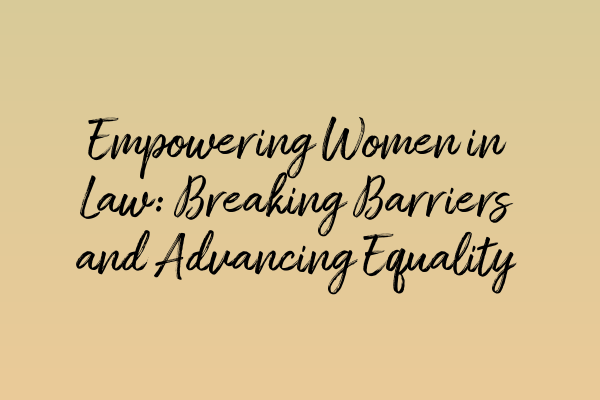Empowering Women in Law: Breaking Barriers and Advancing Equality
When it comes to gender equality in the legal profession, progress has certainly been made. However, there is still a long way to go in empowering women in law and breaking down the barriers that continue to hold them back. In this article, we will explore the challenges faced by women in the legal industry, the importance of empowering them, and the initiatives being taken to advance gender equality.
The Challenges Faced by Women in the Legal Industry
Women have historically been underrepresented in the legal profession, particularly at senior levels. There are still stereotypes and biases that persist, making it difficult for women to progress in their careers. Lack of gender diversity in leadership positions can perpetuate these biases and create barriers for women looking to advance.
Furthermore, achieving a work-life balance can be particularly challenging for women in law. The demands of the profession often require long hours and high levels of commitment, which can clash with family and caregiving responsibilities. This can create a sense of imbalance and make it harder for women to succeed in their legal careers.
Another challenge faced by women in law is the limited access to networking and mentorship opportunities. Building professional relationships and having mentors who can provide guidance and support is crucial for career progression. However, women may face barriers in accessing these opportunities, such as exclusion from informal networks and the lack of female role models in senior positions.
Despite these challenges, there have been significant efforts to empower women in law and create a more inclusive profession.
The Importance of Empowering Women in Law
Empowering women in the legal profession is not just about achieving gender equality, but also about unlocking the full potential of the profession as a whole. Studies have shown that diverse teams lead to better decision-making and improved business outcomes. By empowering women in law, we can tap into their unique perspectives and talents, benefiting both individual firms and the legal industry as a whole.
Furthermore, effective representation and diversity within the legal profession are essential for a fair and equitable justice system. The legal profession should reflect the society it serves, and ensuring women have equal opportunities in law helps to achieve this goal. Women bring different experiences and insights to the practice of law, which can contribute to a more diverse and inclusive legal system.
Initiatives Advancing Gender Equality in the Legal Profession
Various initiatives and organizations are actively working to address the challenges faced by women in law and advance gender equality. These efforts include:
- A Closer Look at the Bar Professional Training Course (BPTC): Providing equal access to legal education is crucial in empowering women in law. The BPTC is a comprehensive and rigorous training program that equips aspiring barristers with the skills and knowledge necessary to succeed in their legal careers.
- The Role of Technology in Modern Legal Practice: Embracing technological advancements can help level the playing field for women in law. Technology can provide flexibility and remote working opportunities, making it easier for women to balance their personal and professional lives.
- A Look into Prominent Law Firms in the UK: Highlighting law firms that prioritize diversity and inclusion can inspire other firms to follow suit. Promoting the success stories of women in law can help change the narrative and encourage more gender-balanced workplaces.
- Staying Ahead: Current Legal Industry Trends in the UK: Staying informed about the latest trends and developments in the legal industry is crucial for women in law. This knowledge empowers them to adapt and thrive in a rapidly changing legal landscape.
- Debunking Common Misconceptions about Solicitors: Addressing and debunking common misconceptions about the legal profession can help attract more women to pursue careers in law. Encouraging a diverse range of individuals to join the legal profession is essential in breaking down gender barriers.
These initiatives, along with many others, are instrumental in creating a more inclusive and supportive environment for women in law.
Conclusion
Empowering women in law is not only a matter of equality, but also a way to enhance the legal profession and ensure a fair and equitable justice system. By breaking down barriers, providing equal access to opportunities, and promoting diversity and inclusion, we can create a legal profession that is truly representative of the society it serves. Let us work together in pushing for greater empowerment, breaking barriers, and advancing equality for women in law.


Leave a Reply